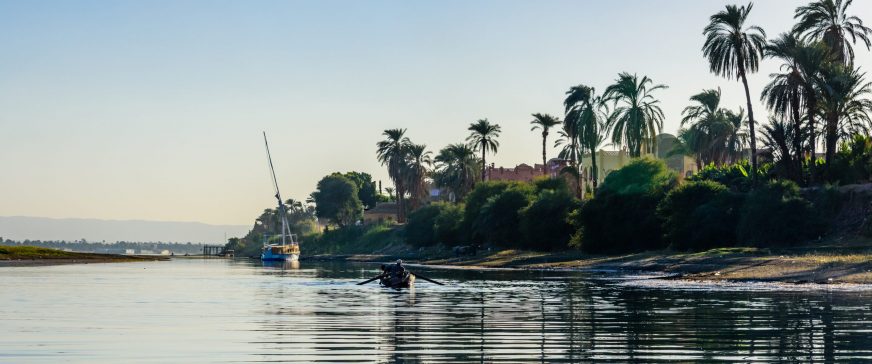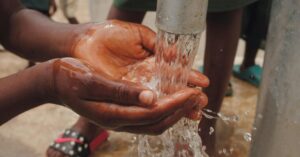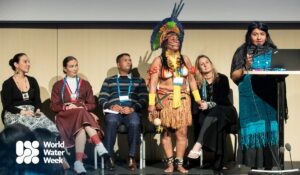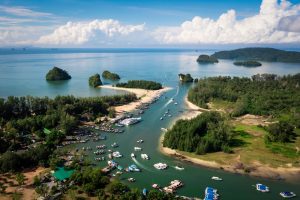- SIWI – Leading expert in water governance
- /
- Latest
- /
- Join the High-Level Panel together for climate-smart security
Join the High-Level Panel together for climate-smart security

As a leading organization in the field of water diplomacy, SIWI is actively working to bring together actors from the climate and security fields.

Both areas of expertise are needed to address the new security threats and climate change-related security risks. On 21 September we will hold our annual High-Level Panel on Water Diplomacy Together for Climate-Smart Security.
Speakers include Carl Skau from the Swedish Ministry for Foreign Affairs, the world-renowned climate expert Professor Johan Rockström, Yana Abu Taleb from EcoPeace Middle East, and Giovanni Romani from the North Atlantic Treaty Organization (NATO).
The International Day of Peace, observed annually on 21 September, has been declared by the UN General Assembly as a day devoted to strengthening the ideals of peace, through observing 24 hours of non-violence and cease-fire across the globe. This year the cause of peace gains additional urgency as many conflict-affected countries are also impacted by the Covid-19 pandemic. In March 2020, UN Secretary General António Guterres made a global appeal to all parties engaged in armed combat to cease military operations to give the world a fair chance to fight against Covid-19.
The global pandemic, together with increasing impacts of climate change and environmental degradation including water scarcity, adds additional challenges to countries and regions affected by armed conflicts, weak institutions, and proxy wars. Coordinated and cooperative efforts across different sectors are more important than ever.
Why are we still working in silos?
In 2016, the Stockholm International Peace Research Institute (Sipri) published a report on Climate-related Security Risks, highlighting the need for effective responses in different policy areas to address climate and security risks and lay the ground for a more integrated approach between foreign policy, development, and security in their response to human insecurity crisis triggered by climate change. Despite a general consensus across different fields that there is a need to work together more effectively, one of the main questions remains how this can be operationalized – on a national, regional, and global level.
A concrete outcome of the report is the Stockholm Climate and Security Hub, established in 2018 by the Swedish Ministry for Foreign Affairs in partnership with SIWI, Sipri, the Stockholm Environment Institute (SEI), and the Stockholm Resilience Centre (SRC). The hub is a platform for evidence-based insights to build security, create prosperity, and strengthen resilience in the face of a changing climate. In addition, the hub supports the breaking down of silos through knowledge exchange and policy dialogues. This is needed to achieve climate-smart security, which we see as an integrated approach linking policy recommendations on strengthening human security (wellbeing of individuals) and national/regional/global security (wellbeing of states).
Climate-smart security
Breaking down silos and adopting an integrated approach to preventing, mitigating, and resolving climate and security risks is needed to strengthen a new climate-smart security narrative. This also means understanding better the linkages between the impacts of climate degradation on human security and its subsequent effect on traditional national security and geopolitics. Impacts of climate change and environmental degradation such as droughts and extreme weather events can indirectly fuel conflicts by creating a fertile ground for terrorist recruitments. For example, droughts in Mali (2009) and Iraq (2006-2007) helped Al-Qaeda respectively ISIS/Daesh recruit new members.
This High-Level Panel on Water Diplomacy is an initiative from SIWI and the International Centre for Water Cooperation (ICWC) to contribute to the climate and security integrated discussion. Invited speakers have direct experience with working across sectors and boundaries in conflict-affected and water scarce regions (Yana Abu Taleb/EcoPeace Middle East), UN Security Council (Carl Skau/Swedish Ministry for Foreign Affairs), regional security organization (Giovanni Romani/North Atlantic Treaty Organization), and climate and security research (Johan Rockström and Dieter Gerten/Potsdam Institute for Climate Impact Research). The speakers will reflect on challenges in building on knowledge and field experience from the diplomatic, security, climate research, and civil society perspective. Can we recover from the Covid-19 pandemic in a climate-smart way?
On the occasion of the International Day of Peace you are invited to join SIWI’s High Level Panel on Water Diplomacy – Together for Climate-Smart Security – register now!
Most recent

SIWI’s endorsement of the COP29 Declaration on Water for Climate Action
- Water and climate
- World Water Week
- Water governance

SIWI-WASH experts join IVL
- Water, Sanitation and Hygiene (WASH)
- Water governance

Women hold the key to building climate resilience
- Gender and water
- Resilience through water

Transforming relations through WASH access

Fostering cooperation at World Water Week’s Opening Ceremony

First Nations Focus at World Water Week

